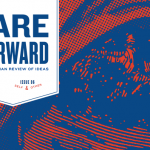For as long as I can remember, my dad has fasted every Wednesday and Friday – eating nothing but bread and drinking nothing but water. At a young age, the very prospect of fasting seemed not only daunting but ludicrous. Human loves exist to attract us to the things that are good for us. And food is obviously good. Why would you want to deprive yourself of it?
The most obvious answer to this question is that you may want to abstain from eating for health reasons. But this very possibility – that our health may be compromised by overeating which then has to be compensated for by fasting – points to a deeper problem. Our loves may direct us toward things that are good for us, but they often don’t do so in the right way.
Sometimes we love too much, as when we watch an extra TV episode instead of getting to work. Other times we love too little, as when we don’t give a troubled friend our full attention. And all too often we fail to love properly that which we should love above all else: God.
It is the will that has to sort all of this out, and it is the will that is most strongly affected by fasting. On a normal day, the will is bombarded with impulses, urging it to eat, to post a snarky comment on Facebook, to take a break from writing a blog post, to have a drink, etc. Though the will has some power of its own, this power is limited. Much of what we do is motivated by these torrenting impulses. In order for the will to choose what it knows to be best, the impulses which storm it must not be so strong as to overwhelm it. Furthermore, the will itself must have enough power to generate motivation when it doesn’t arise on its own.
Fasting helps on both of these fronts. On the more obvious side, fasting lessens our desire for food to the extent that we not only acquire the ability to forgo food when it’s best not to eat, but also that we may enjoy the peace of a mind no longer assailed with hunger pangs.
On the other side, fasting helps to strengthen our will itself. When I first tried it, I was astounded at my own immaturity. Although there had been times when I had gone for hours on end without food because I was busy with work, somehow I couldn’t make it through an hour without the back of my mind childishly hankering over the leftovers in the fridge. Not getting what you want causes discomfort, and in this scenario, when I’ve made a firm decision to keep the fridge closed, the object of my desire won’t come to console me. That, however, does not mean that there are not other means of consolation.
In this distressed state, the will begins to look for other sources of comfort. The most accessible sources of comfort are physical, such as taking delight in the sight of a glorious day. But they can also be spiritual, and this is the highest benefit of fasting. As Jean-Pierre de Caussade put it, one must learn to recognize each moment as an “ever-flowing source of holiness.” This realization, and the assuaging comfort that it brings, deepen and strengthen with practice.
But the best practice that I’ve found for this is fasting. When I’m feeling good and have no problems in life, I easily grow complacent. It is when I’m in distress that I am prompted to look for God’s presence in my life. Over time, however, one learns not to need constant distress to see God’s hand. Doing so becomes a habit – a habit every Christian should strive to develop.
Seeing God’s presence in your life puts everything else in its proper place. The work you know you ought to do because the gifts God gave you were meant to be given becomes more important than an extra episode of TV. It becomes easier to give your friend the attention he needs since, after all, God loves him too. But most of all, recognizing the presence of God allows the soul to be lifted to the highest of heights, where it is alone with God in peaceful contemplation.













